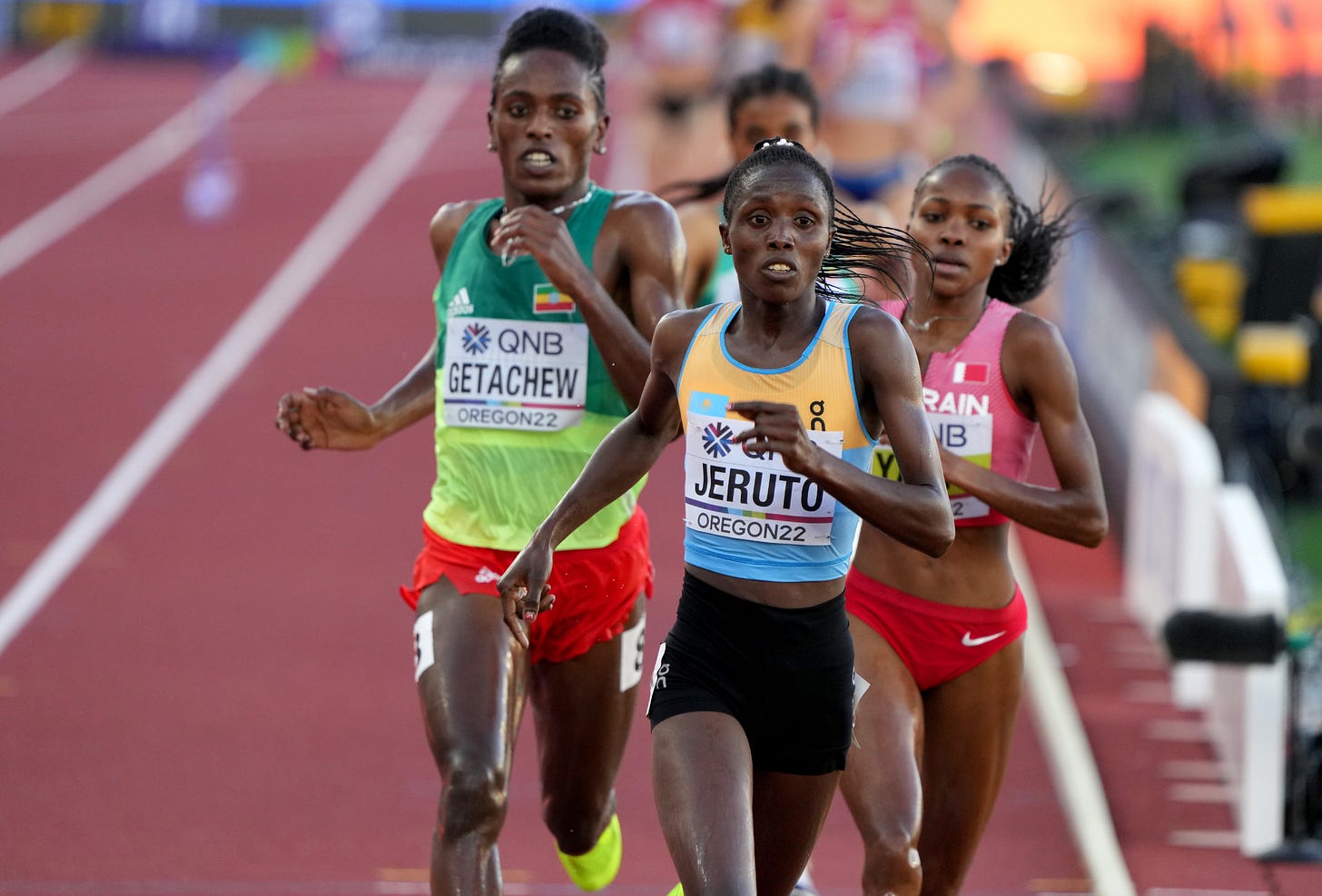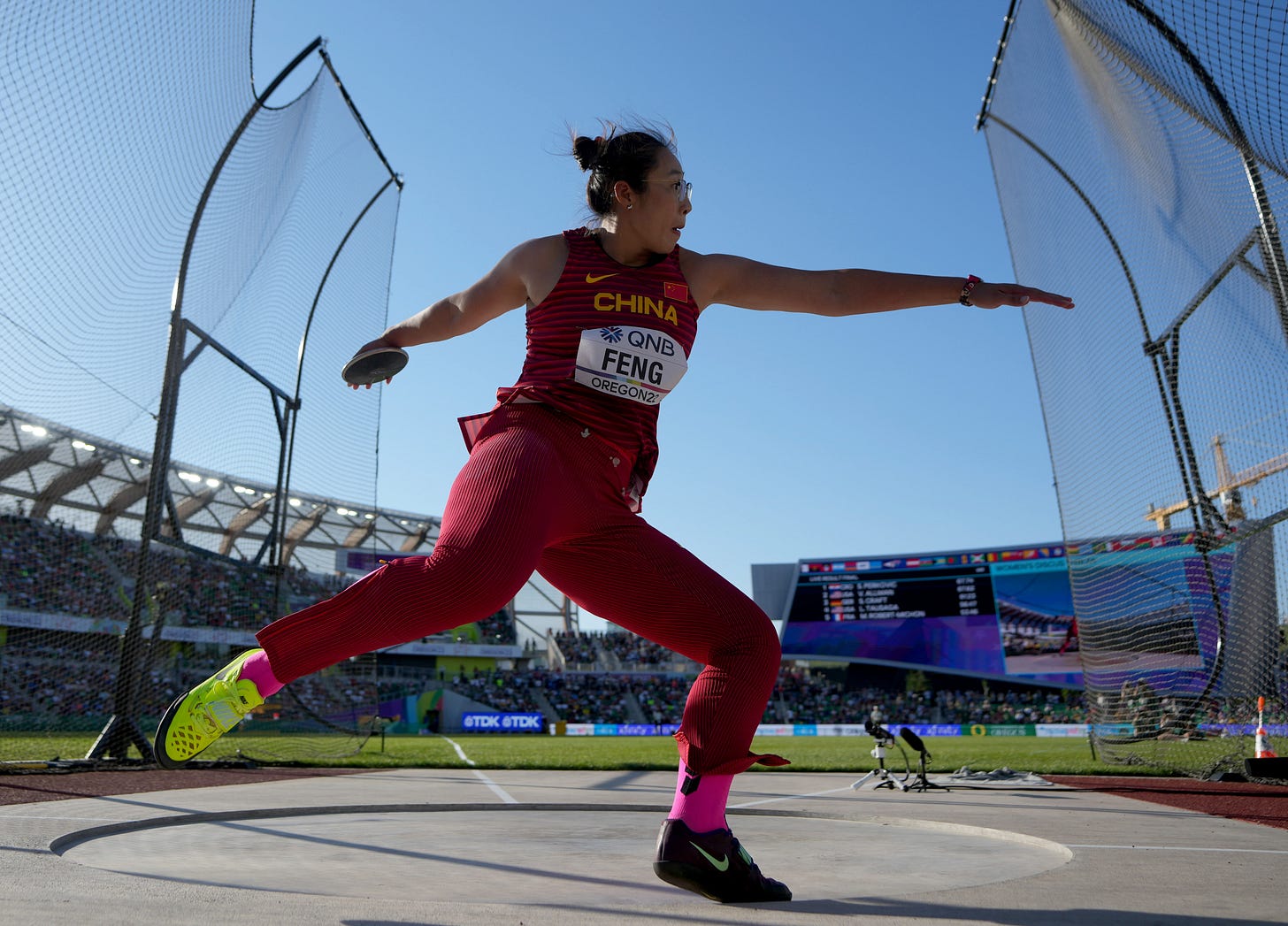Front-running style sets World Champs record in women's steeplechase
Jeruto wins title by pushing the pace from the start of the race

EUGENE, Oregon – It did not have the pizzazz or flashiness of a come-from-behind victory in the final home straightway. But the manner in which Norah Jeruto won the women’s 3,000-meter steeplechase in the World Athletics Championships on Wednesday might have been more impressive.
The Kenyan native who has been representing Kazakhstan since the start of the year controlled the race from the front of the pack before spurting to a quick lead coming out of the final water jump and recording the third fastest time in history.
The 27-year-old runner’s winning time of 8 minutes 53.02 seconds was a meet record and helped Werkuha Getachew and Mekides Abebe become the first two Ethiopians to break nine minutes when they crossed the finish line in personal bests of 8:54.61 and 8:56.08, respectively.
In addition, those times made Getachew and Abebe the fourth- and fifth-fastest performers in history in the women’s steeplechase, which was added to the World Championships program in 2005.
“They are also champions like me so I was scared of them,” Jeruto told World Athletics when talking about Getachew and Abebe. “It was not easy. It was tough. I decided to be in the front because I like to control the race and to be in the front to make sure I can fight for medals.”
Winfred Yavi of Bahrain led the field through the first lap in 68.39 seconds before Jeruto was in the lead when the runners passed through the second and third laps in 2:20.34 and 3:34.38, respectively.
Yavi led again at the four-lap mark in 4:46.88, but Jeruto was back in the lead when she passed the five-lap mark in 5:58.29.
The lead pack was down to Jeruto, Yavi, Getachew, and Abebe at hat point and it was still that way as the quartet approached a lap left in the race.
Jeruto, who had run an insanely fast – and some would say reckless – 9:01.54 in her qualifying heat on Saturday, appeared to be in control of the proceedings at that point, but Yavi briefly re-took the lead from her with a lap left in the race.
Jeruto, perhaps not wanting Yavi to feel confident about winning the race, regained the lead a few strides later and would never trail again.
She led Gathachew, Abebe, and Yavi down the backstretch as the crowd roared its approval at the battle it was witnessing.
Yavi had dropped back of the leading trio as they approached the final water jump midway through the last turn. But any thoughts of a thrilling homestretch duel were squashed when Jeruto spurted to a four- or five-meter lead coming out of the water jump before expanding her advantage over the final 140 meters of the race.
While Getachew and Abebe would cross the finish line with the fifth- and ninth-fastest times ever run, an exhausted Yavi would place fourth in 9:01.31.
What happened next was unconventional, but made perfect sense considering how stifling the heat had been during the day. Jepruto made her way back to the water jump on her victory lap and promptly took a dip in it to cool off. Getachew and Abebe soon joined in and it wasn’t long before Legend, the meet’s bright yellow, goofy, Bigfoot-like mascot, was frolicking in the water, costume and all.
It was a joyous, child-like celebration that occurred at the end of the sixth day of the 10-day meet that will conclude on Sunday.
The steeplechase was one of two finals contested on a day heavy with semifinal and first-round action.
The women’s discus was expected to be a duel between Valarie Allman of the U.S. and Sandra Perkovic of Croatia.
Allman won the Olympic title last year had the best mark in the world this year. Perkovic had been the gold medalist in the 2012 and ’16 Games, and finished first, second, first, and third in the four previous World Championships.
Allman, throwing fifth in the order in the 12-competitor field, took the lead with a first-round throw of 67.62 meters (221 feet 10 inches), but Perkovic topped that with a 67.74 (222-3) mark as the following thrower in the order.
After Olympic silver medalist Kristin Pudenz of Germany fouled on her first throw, Bin Feng of China unleashed a toss of 69.12 (226-9).
The mark added more than three meters to her previous best of 66.00 (216-6) and neither she nor anyone else would be able to match it or exceed it.
Perkovic would improve her best to 68.45 (224-7) in the second round and Allman would throw 68.30 (224-1) in the third round, but they could not catch the 28-year-old Feng who had finished fifth in the 2019 World Championships, but been eliminated in the qualifying round of the Olympics.
“I did not expect this result coming to Eugene, I just wanted to show my best,” Feng said. “I am surprised by my gold medal, but honestly not with the result. I expected the fight like this for the podium and I was sure it was going to be tough.”

In addition to the finals in the women’s steeplechase and discus, semifinals were held Wednesday in the women’s 400-meter hurdles, and in the men’s and women’s 400.
Sydney McLaughlin of the U.S., the Olympic champion and world-record-holder in the 400 hurdles, won the third – and final – semifinal in 52.19 seconds, the eighth-fastest time in history.
Olympic bronze medalist Femke Bol of the Netherlands won the second semifinal in 52.84, and Olympic silver medalist and defending World champion Dalilah Muhammad of the U.S. won the first semifinal in 53.28.
Americans Shamier Little and Britton Wilson also advanced to the final of the 400 hurdles, which will be held on Friday, at 7:50 p.m., Pacific time.
The men’s 400 semifinals were won Americans Michael Norman (44.30) and Champion Allison (44.71), and by Grenadian Kirani James (44.74).
Wayde van Niekirk of South Africa finished second (44.75) to Allison in the third semifinal to advance to his first World Championship final since 2017.
The South African, who turned 30 last week, set the world record of 43.03 in winning the 2016 Olympic Games in Rio de Janiero. He also won World titles in 2015 and ’17, but has battled injuries since then.
Michael Cherry of the U.S. was a notable non-qualifier as the fourth-place finisher in the Olympics placed fourth in his semifinal with a time of 45.28.
The women’s 400 semifinals were won by two-time Olympic champion Shaunae Miller-Uibo of the Bahamas (49.55), and by the Domincan Republic’s Marileidy Paulino (49.98) and Fiordaliza Cofil (50.14).
U.S. champion Talitha Diggs finished a non-qualifying third in 50.84 in her semifinal as no Americans advanced to the final.
Gudaf Tesgay, who won the women’s 10,000 meters last Saturday, won her qualifying heat of the women’s 5,000 in 14 minutes 52.64 seconds on Wednesday. Fellow Ethiopian Letesenbet Gidey took the other semifinal in 14:52.27.
Haruka Kitaguchi of Japan was the leading qualifier in the women’s javelin with a throw of 64.32 (211-0) and Olympic champion Shiying Liu of China was the No. 2 qualifier at 63.86 (209-6). However, Olympic silver medalist Maria Andrejczyk of Poland (55.47/182-0) and U.S. record-holder Maggie Malone (54.19/177-9) did not advance to the final.
In the men’s 800 meters, Marco Arop of Canada posted the fastest first-round time when he won the fifth of six heats in 1:44.56.
Max Burgin of Great Britain, who ran a yearly world leading time of 1:43.52 on June 14, withdrew from his heat with an injury.
Defending World champion Donavan Brazier, who has been battling injuries since last year, failed to advance to the semifinals as he placed sixth in his heat in a time of 1:46.72.
No Americans advanced to the semifinals, including Bryce Hoppel, who placed fourth in the 2019 World Championships.




